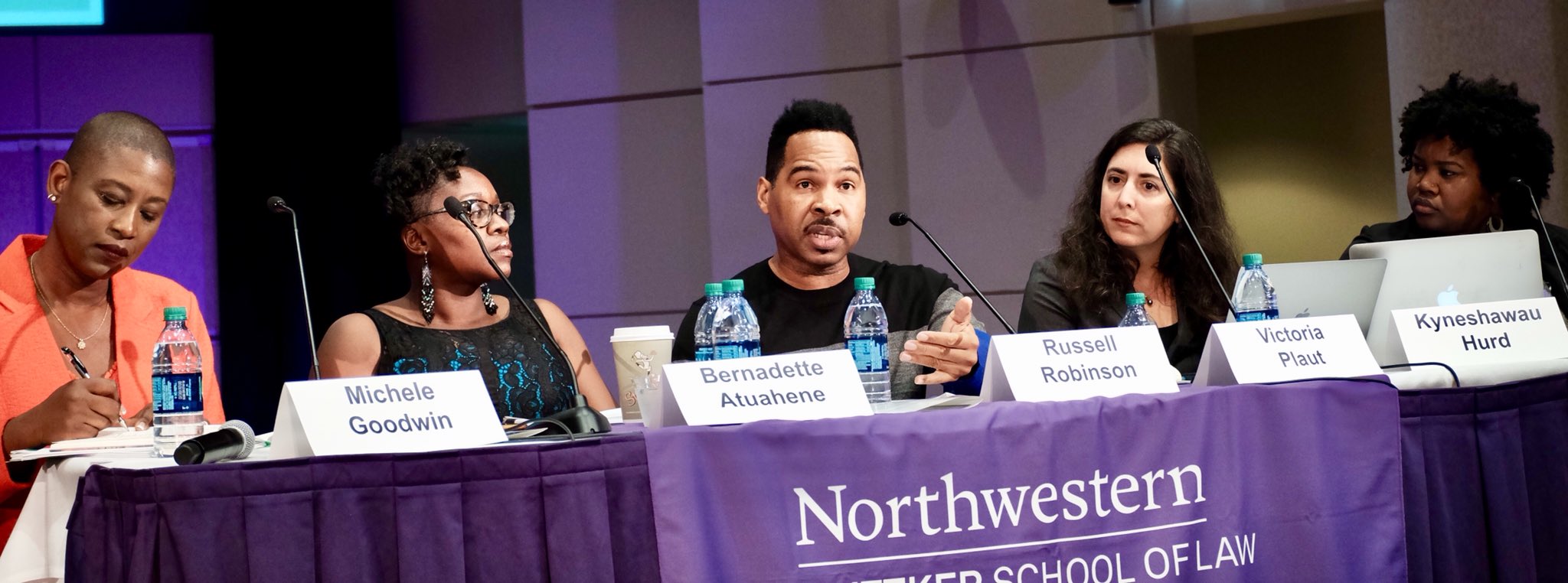Equal Protection and the Social Sciences Beyond Criminal Justice
Following a discussion about the use of social science evidence in the criminal justice system at the Northwestern University Law Review Symposium, Professor Laura Beth Nielsen (Northwestern, Sociology) moderated a panel that explored the varying degrees of success social science has had and the challenges faced by advocates in civil rights litigation.

Professors Russell K. Robinson (Berkeley) and David M. Frost (Columbia) examined the use of social science research in Obergefell v. Hodges (2015), where the American Psychological Association presented two types of social science research in their amicus brief in support of petitioners. Robinson and Frost termed these “sameness studies” and “minority-stress studies.” Sameness studies demonstrate that there are no differences between heterosexual and homosexual couples in intimate relationships, while minority-stress studies focus on the psychological effects of being stigmatized by society, such as depression and anxiety. Each of the two types of studies was cited and played a role in the Supreme Court’s decision. The Court emphasized sameness, for example, when it noted that “many same-sex couples provide loving and nurturing homes to their children, whether biological or adopted.” It then noted that without marriage, children of same-sex parents “suffer the stigma of knowing their families are somehow lesser.” The authors noted that the Obergefell opinion is inconsistent in that it acknowledges the stigma same-sex couples and their families face while simultaneously declaring that the exclusion of such couples from the institution of marriage is a view held in “good faith by reasonable and sincere people here and throughout the world.”
Professor Bernadette Atuahene (IIT Chicago-Kent) described the use of social science research in ongoing litigation challenging tax foreclosures in Wayne County, Michigan. The plaintiffs in that lawsuit argue that the county failed to reassess property taxes after the Great Recession, resulting in high tax assessments that violated the Michigan Constitution. Homeowners were then subject to tax foreclosure for their inability to pay the property taxes. Atuahene’s research showed that the tax foreclosures disproportionately affected predominantly black neighborhoods, with rates 10 to 15 times higher than in predominantly non-black neighborhoods. The plaintiffs’ advocates argue that this constitutes illegal housing discrimination in violation of the Fair Housing Act. Although the social science research does not establish discriminatory intent, Atuahene noted that the plaintiffs could prevail because the Fair Housing Act prohibits neutral practices with a disparate impact on a protected class––not just intentional discrimination.
Professor Victoria Plaut (Berkeley) and Ph.D student Kyneshawau Hurd (Berkeley) explored how the focus of higher education affirmative action policies has shifted from remedying past discrimination to promoting diversity. In Regents of the University of California v. Bakke (1978) and Grutter v. Bollinger (2003), the Supreme Court concluded that (1) reducing the deficit of traditionally disfavored minorities, (2) remedying past discrimination, and (3) increasing the number of practitioners in underserved communities were all impermissible justifications for race-conscious admission policies. Instead, the Court approved the diversity rationale, concluding that promoting diversity in higher education was a compelling interest. Plaut and Hurd cautioned that the diversity rationale appears to benefit students in the majority, portraying students of color as subjects to enrich the experiences of other students. Their study showed that white students who considered themselves egalitarian but scored high on social dominance tests were more likely to support race-conscious admission policies for their diversity benefits than to remedy past discrimination. Plaut and Hurd argued that this focus on diversity fosters a sense of entitlement in white students that undermines inclusion.

Professor Michele Goodwin (UC-Irvine) discussed the different “rhetorical traps” used to deprive women––particularly women of color––of their reproductive rights. False information about the safety of abortion is widespread, and states rely on this misinformation to enact laws that restrict women’s access to reproductive services. Under the guise of protecting the health of women and unborn fetuses, these laws require women to wait for a period of time before they are permitted to receive an abortion, and employers can limit benefits to services they believe to involve abortion. In some states, a woman with a substance-abuse problem can be arrested for “endangering her pregnancy.” Goodwin’s scrutinized the rhetoric underlying such policies and demonstrated the absence of any empirical basis to support it. She mentioned, for example, that a woman is fourteen times more likely to die from complications of live childbirth than she is to die from complications of abortion. Goodwin noted the importance of challenging such rhetorical traps because they endanger the lives of women, especially women of color.
The panel emphasized that social science research still has a long way to go to be accepted as evidence of discrimination. In Obergefell, the Supreme Court cited minority-stress studies but stopped short of labeling the majority view as discriminatory. The plaintiffs in the Wayne County tax foreclosure litigation only have a valid claim because the Fair Housing Act does not require proving discriminatory intent. And in the area of race-conscious admission policies, the Supreme Court has shifted its focus from remedying past discrimination to promoting diversity. The Court today is not any more receptive to the use of social science than it was in McClesky v. Kemp (1987).